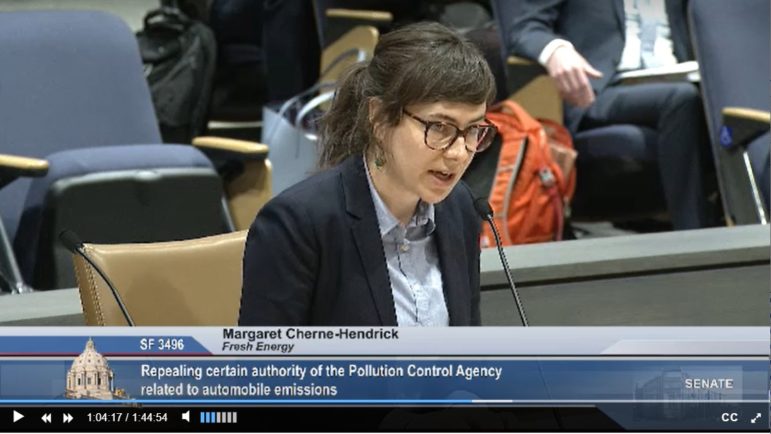
The 2020 regular session of the Minnesota Legislature has adjourned. Despite a flurry of final weekend activity, the outcomes for clean energy were disappointing, and plenty of work remains undone in advance of a likely special session in June. With the unprecedented circumstances surrounding COVID-19, operations at the Legislature have been significantly impacted. Fresh Energy is working hard to make sure that clean energy issues will continue to be considered when special session convenes, likely on June 12, 2020.
The highlight of the final weekend was completion of a bill allocating revenue from the Renewable Development Account (RDA) to four consensus clean energy projects:
- Prairie Island Indian Community Net Zero Project: RDA funds will help the Prairie Island Indian Community become Minnesota’s first net-zero energy community.
- Xcel Solar Rewards: RDA funds will help Xcel extend its program that pays incentives for qualified residential and small commercial solar systems into 2024.
- Granite Falls hydropower dam: RDA funds will pay for a new turbine and help the dam undergo repairs.
- Community transition grants: RDA funds will support economic development activities in communities with retiring coal plants.

Thank you to Senate Energy Chair Sen. David Osmek (R-Mound), House Energy and Climate Chair Rep. Jean Wagenius (DFL-Minneapolis), and Department of Commerce Commissioner Steve Kelley for negotiating and advancing these projects, which all of which will benefit clean energy in Minnesota. The RDA bill now heads to Governor Walz for his signature.
Unfortunately, no action was taken in the Senate on the Energy Conservation and Optimization (ECO) Act. Fresh Energy has been an active leader on this critical suite of updates to Minnesota’s bedrock energy efficiency programs, which was passed by the Minnesota House on May 11 with bipartisan support. The ECO Act was developed over multiple years with an incredibly broad set of energy stakeholders; the bill takes a balanced and innovative approach to energy efficiency and has the potential to drive significant cost savings for energy customers throughout Minnesota. Read more about ECO here. Fresh Energy looks forward to continuing work on this critical issue in special session.
Attempts to pass a final bonding bill also fizzled during the last weekend of the session. State bonding is a critical tool for driving job creation in public works projects—something that is particularly vital amidst the current economic crisis. Bonding projects also have enormous potential as a strategy for driving down carbon emissions. Transportation is a key component of the bonding bill, including support for building infrastructure for both transit and electric vehicles. Check out this recent report on the job benefits of transit and electric vehicle infrastructure. It is very likely that bonding will at the top of the “to do” list for legislative leaders when they return in June; we strongly encourage the inclusion of significant resources for transit and electric vehicle charging infrastructure!
Two provisions of concern also failed to advance, due to the defensive efforts of Fresh Energy and our partners. Both the House and Senate voted on provisions to strip the Minnesota Pollution Control Agency’s authority to protect public health from harmful vehicle emissions. While the Senate ultimately passed their provision, the House did not and no final outcome occurred on the bill. While it is likely that interest groups from the petroleum and automobile industries will try again in special session, the strong signals from House leadership and the Walz Administration make it very unlikely to succeed. In a final late session move, the Senate also passed a sweeping housing bill that included a variety of policy rollbacks to Minnesota’s energy and building codes, despite demonstrable evidence that these established standards save money for homeowners and renters throughout the state. No similar action was taken by the House and the final bill did not advance after the Senate vote.
Fresh Energy’s government affairs team is already gearing up for special session expected to begin on June 12. We will be working hard to advance unfinished clean energy and bonding priorities, and holding the line on rollbacks to existing bedrock policies. We have appreciated your support during this challenging and unprecedented session, and look forward to more clean energy progress ahead!
